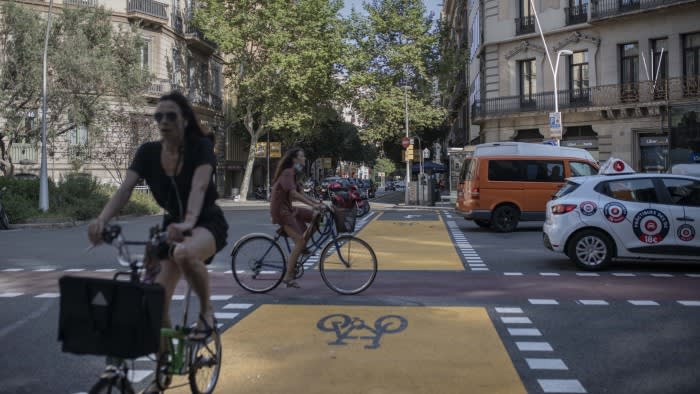The EU has offered to strike a deal to allow 18-30-year-old UK citizens to work and study in the bloc for up to four years.
The European Commission on Thursday said it would seek member state approval to open talks with the UK to restore the ability of young people in the EU and UK to live and work in each others’ countries.
“The more we have young people being on both sides of the Channel, the more we increase the possibility and probability that we will be on good terms because the next generation knows each other very well,” Ursula von der Leyen, commission president, said in Brussels.
But it received a cool response from the opposition UK Labour party, which is leading in the polls ahead of an election expected this year.
A Labour official said the party saw youth mobility schemes as “synonymous with freedom of movement”, noting it had ruled out a return to free movement as one of its Brexit red lines.
A spokesperson told the Financial Times that “Labour has no plans for a youth mobility scheme”, but added it would look to improve UK-EU relations in other ways.
The party said the commission’s proposal had come about because the “UK government is reportedly approaching other European countries to try to establish mobility arrangements” on a bilateral basis.
When the UK left the EU in 2020, it ended the automatic right to live and work in the bloc.
The commission said: “This situation has particularly affected the opportunities for young people to experience life on the other side of the Channel and to benefit from youth, cultural, educational, research and training exchanges.”
The UK has struggled to replace the au pairs, agricultural workers and restaurant staff that once came freely from the EU. It has offered bilateral deals to countries including Spain, Germany and Poland, but the commission has been adamant that the bloc should negotiate jointly.
UK officials noted the commission’s proposal had not yet been agreed by the bloc, but insisted Britain was not opposed to the idea in principle. “It entirely depends on what’s put forward,” said one.
A UK government spokesperson said: “We have successful youth mobility schemes with 13 countries, including Australia and New Zealand, and remain open to agreeing them with our international partners, including EU member states.”
EU officials told the FT the bilateral deals allowed London to cherry pick the workers it wanted while keeping out those from poorer member states such as Romania and Bulgaria.
Jessika Roswall, Sweden’s Europe minister, told the FT that Stockholm had turned down a bilateral deal. “We are a union and we stick together,” she said, adding that an agreement would be a “win, win”.
Negotiations, which require the consent of the 27 member states and the UK, could be difficult. Brussels wants EU students studying in Britain to pay the equivalent of domestic fees, potentially costing British universities tens of millions of euros.
The commission proposed the mobility scheme would not be “purpose-bound” so those who finish their studies would be able to work. It also ruled out quotas. UK citizens would only be able to work in a single EU country.
Brussels also said fees for issuing a visa or residence permit should not be “disproportionate or excessive” and that those on the scheme should be exempt from the £776 NHS healthcare surcharge that is applied to UK youth mobility visas.
Tory MP Mark Francois, chair of the European Research Group of hardline Brexiters, said he wanted to see the details, but remarked: “I would just observe that during the referendum campaign we were threatened that if we left the EU we would be ostracised and permanently isolated. This hardly looks like that now, does it?”
UK business leaders are pressing the government to agree to talks.
Charles Owen, managing director of Seasonal Business in Travel, a lobby group for the outbound travel sector, said: “A reciprocal youth mobility scheme is a win-win for both Europe and the UK, and in particular for struggling businesses suffering from chronic labour shortages, made worse by Brexit.”
In recent months the UK has drawn closer to the EU. It rejoined the Horizon research programme and Copernicus satellite system but has refused to re-enter Erasmus, the student exchange scheme, on cost grounds.
Additional reporting by Alice Hancock in Brussels
